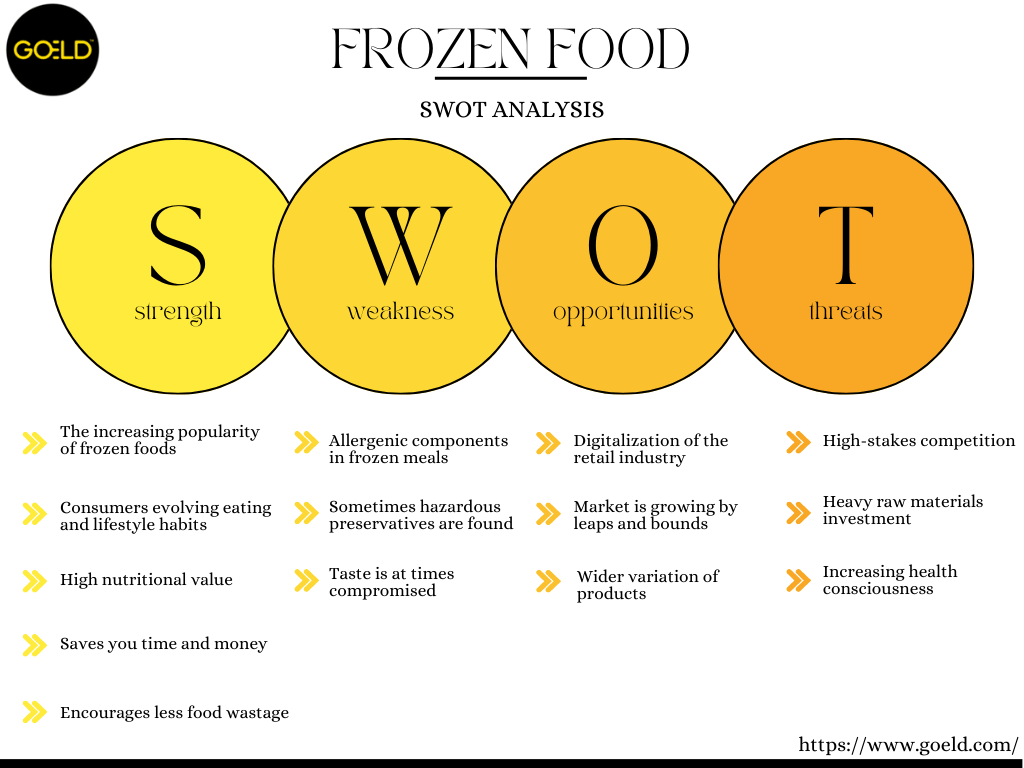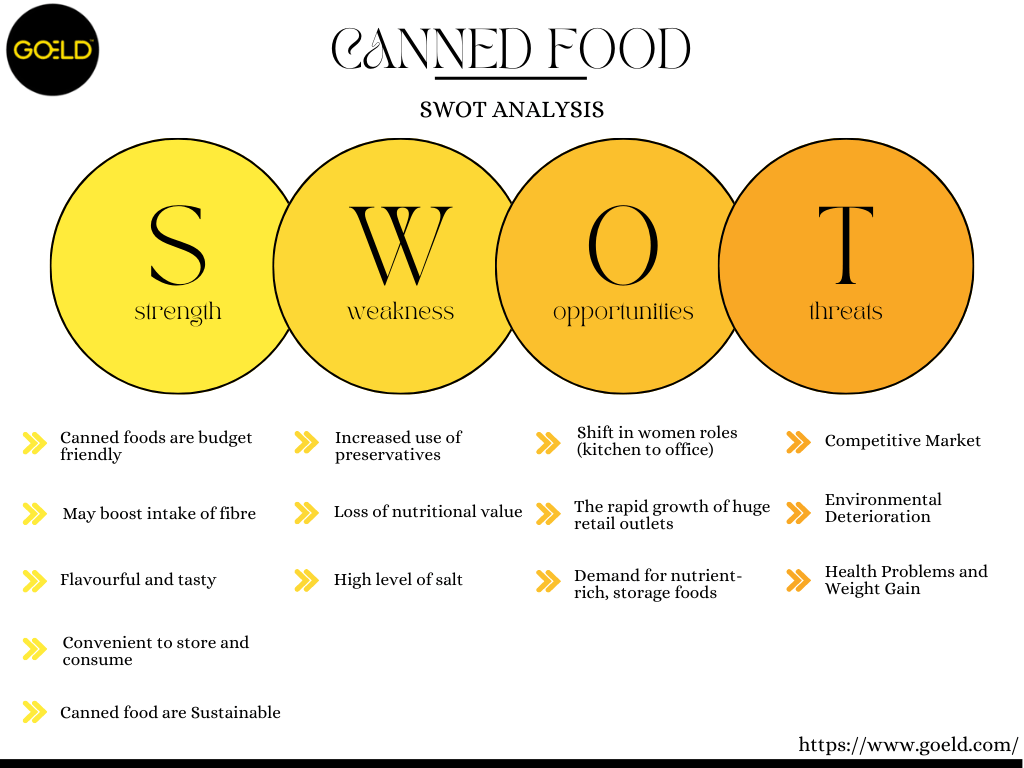A balanced diet is necessary to maintain your body’s health and level up daily. Have you ever wondered, though, if canned or frozen foods are better?
A balanced diet is necessary to maintain your body’s health and level up daily. Have you ever wondered, though, if canned or frozen foods are better?
For a 360-degree understanding of each frozen foods and canned foods, let’s do a SWOT analysis. By the end of this blog, you should be able to make more informed and thoughtful decisions for a healthier future.
Let’s look at the SWOT Analysis for each Frozen food and canned food in order to help you understand better.

Frozen Foods – Strength
The increasing popularity of frozen foods
The demand for products that may be conveniently and quickly prepared, such as frozen meals, is rising as more and more people lead hectic lifestyles. People are more likely to spend money on convenience goods while adding nutritional value to their daily diet. With more and more women leaving the traditional kitchen roles and taking the corporate world with a breeze, the lesser the time it takes to prepare a meal the more it is preferred. This market has tremendous growth opportunities and will evolve with time.
Consumers evolving eating and lifestyle habits
The demand for frozen ready meals is rising due to rapid urbanization and changing consumer lifestyles. The boost in convenience, availability, affordability and accessibility of frozen-ready meals makes it an excellent choice for satisfying customers’ daily nutritional needs quickly.
High nutritional value
Not many of you are well versed in the benefits of a well-known method of food preservation – “Freezing”. Utilizing artificial preservatives traditionally v/s modern quick-freezing techniques locks the nutritional value of the food. Additionally, food that is kept and frozen right away avoids loss of nutrition. In terms of calories, frozen fruits and vegetables have the same nutritional value as compared to fresh foods. With no extra potassium added as a preservative, frozen food becomes an apt choice for quick food solutions.
It saves you time and money
With a massive number of supermarkets and stores housing frozen food items, you can buy and consume frozen food on the go making it so convenient and ideal for people looking for a healthy quick meal. Over and above that, it also assists you in portion control and resisting you the urge to overeat at a restaurant. Helping you save money and time, frozen foods have turned their coins towards health as well as variety.
Encourages less food wastage
Frozen meals can aid in reducing food waste. Food wastage at home or at the workplace can be considerably minimized by only preparing what is required for the meal at hand and re-freezing the rest for future use.
Frozen Foods – Weakness
Allergenic components in frozen meals
It is recommended to watch for some particular ingredients, especially if you know you are allergic to some. When someone suffers from a food allergy, their immune system responds to particular foods, which can lead to minor skin problems or discomfort with hypertension. It is a good habit to run your eyes through the ingredients list on every frozen food package before making a purchase.
Some frozen foods contain hazardous preservatives.
Not all frozen foods have preservatives, but sadly some do. To enhance the shelf life of the consumable, some frozen food brands add harmful preservatives which can affect our health badly. These preservatives have the potential to not only cause serious health problems in some people but also can attract fetal diseases. Thrive for products that claim they do not add preservatives for a healthier choice.
Compromised taste compared to freshly cooked food
The flavor of freshly cooked food may not always be the same when it’s frozen. The traditional notion is that major food producers are also responsible for diminishing the taste of processed frozen foods as they tend to prepare them in large batches, which at times compromises taste.
Frozen Foods – Opportunity
Digitalization of the retail industry
Two of the most recent trends propelling the frozen food sector are online grocery shopping and the launch of new apps that make it simple for users to select their desired products. Consumers are more inclined to shop as a result of benefits like convenience, choice, and product information online.
The frozen foods market is growing by leaps and bounds
The global frozen food market has been expanding steadily in recent years due to numerous factors, including the ability to save money, prepare meals quickly, spend less time in the kitchen, and avoid food wastage.
Wide variety to choose from in frozen food products
Due to the rising demand for frozen food, the frozen food sector, which first just offered basic frozen veggies and fries, now provides a wider range of products like fully packed wholesome frozen meals. Over and above this to satisfy your 5 pm cravings they also have also stepped into healthy snack items to keep your tummy happy till dinner time.
Frozen Foods – Threats
High-stakes competition
There has been a fierce rivalry in the frozen food business as a result of the rising demand for frozen meals. To maintain its market and boost sales, the business must assure not only quality but innovation to keep its consumers griped and longing for more.
Heavy raw materials investment
Prices for raw goods like flour, vegetable oil, and uncooked vegetables have increased significantly. Such heavy investments in raw materials put price pressure on the total annual expenses of an organization. In order to balance this cash outflow, organizations then tend to lower costs in packaging or employees.
Increasing health consciousness
Globally, especially in developing countries, health awareness is taking a whole new meaning compared to traditional thinking, which may lead to a decrease in the consumption of frozen and fast foods. Knowledge is power and being informed about some frozen foods myths and facts will turn tables for the frozen foods market.

Canned Foods – Strength
Canned foods are budget-friendly
Canned products ought to be your first choice if you’re seeking less expensive consumable options! The costs of fresh vegetables might at times be inexplicable. However, they are virtually always less expensive than their canned counterparts, with prices that are lower than those of fresh.
May boost the intake of fiber
Numerous studies have shown a strong correlation between increased fiber intake and notable weight loss. For a healthy digestive system, fiber is essential. According to research, canning increases the amount of soluble and healthful fiber in some foods, like beans, which might enhance wellness.
Flavourful and tasty
Because canning included added flavors and added color, it tends to be tastier and flavourful as compared to fresh and frozen foods. The quantity of minerals, fat-soluble vitamins, protein, fat, and carbohydrates is unaffected in the canning procedure.
Convenient to store and consume
Can also have the benefit of being very practical for storage needs. In your cellar, you can keep canned food for a considerable amount of time and it will still be safe to eat after some time. Food in cans may occasionally still be safe to eat years later.
Canned food is Sustainable
After processing, canned foods often last between one and five years in the pantry! Compared to the typical 3–7 days for fresh vegetables, this window is substantially longer. This prolonged shelf life can help in lowering food waste, which is crucial for maintaining a sustainable world.
Canned Foods – Weakness
Increased use of preservatives to enhance taste and color
With brilliant taste and aesthetics comes a drawback that is harmful to us. Ever thought of how can you get this? Sometimes a lot of preservatives are added to food in cans to make it even more durable and flavourful. Not all preservatives are harmful but some can really do bad to your digestive system.
Loss of nutritional value once canned
When compared to eating freshly picked crops, canned foods have some nutritional value loss. They will lose nutrition if kept in storage for a long time. When canned, some veggies and fruits lose several of their nutrition. A fruit or vegetable lacks fiber when the peel is removed. Since canned goods frequently use this practice, choosing canned foods over fresh fruits will cause you to lose out on some crucial nutrients.
High level of salt
Since dissolved salt is frequently utilized in the canning process, it serves as a significant dietary salt source. With this, you are inviting high blood pressure, which may increase the risk of heart attacks and strokes, which is one health issue that is raised by excessive salt consumption.
Canned Foods – Opportunities
A shift in women’s roles (kitchen to the office)
The reliance of consumers on convenience foods and ready meals has expanded as the number of working women increases. In turn, this has increased consumer demand for nutritious, shelf-stable food, which eventually supports the market for canned foods.
The rapid growth of huge retail outlets
The consumption of canned food has increased as a result of the quick global spread of large retail establishments like hypermarkets/supermarkets and online sales channels. Retail stores have emerged as one of the most preferred places to buy them since during a lockdown, people used to buy canned food because it could be stored and consumed for a longer period.
Demand for nutrient-rich, storage foods
You need certain nutrients for growth and repair, which will keep you strong and healthy and aid you in preventing diseases just like cancers that are linked to nutrition. Most of the rise in demand for nutrient-dense, shelf-stable foods can be attributed to the popularity of canned food.
Canned Foods – Threat
Competitive Market
Food in cans is instant food that is typically affordable and available in regular stores. As they are convenient to store and don’t need refrigeration, individuals frequently prefer tinned food. Foods in cans, as the term indicates, are prepared for consumption and can be preserved for a prolonged period without going to waste.
Environmental Deterioration
Littering is a significant problem associated with the use of canned food since the packaging is frequently not disposed of correctly. The water, air, and last but not least solid pollution caused by the food canning industry “have harmed the environment”
Health Problems and Weight Gain
Health problems may result from consuming canned food regularly. It has a high sugar and trans fat content, which raises cholesterol and may cause diabetes, obesity, and possibly diabetes-related complications.
Summing up
Though both frozen foods and canned items have their own set of advantages and disadvantages frozen foods get a higher edge due to their diet friendly and having the least or no added preservatives component. As it is flash-frozen immediately, it ensures not only nutrition lock but also the least nutrition loss. Keeping them as fresh as plucked on day 1, they maintain their promise of being fresh.
Who are we?
From delicious, incredible frozen Indian curries to mouthwatering healthy snack frozen items, Goeld ensures to satisfy its ever-craving consumers with innovative yet diet-friendly frozen food items. Leading the global surge of frozen foods, we manufacture 100% vegetarian frozen foods in 100% vegetarian kitchens.



